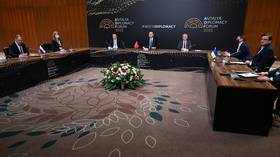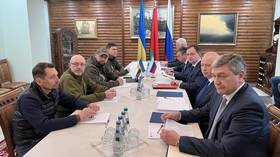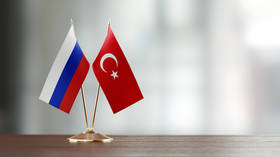Russia says West not welcome at peace talks

Russia is eager for a diplomatic solution to the conflict in Ukraine, but it won’t accept any Western mediation during its talks with Kiev, the Foreign Minister Sergey Lavrov has said.
“We’re ready to give diplomacy a chance. That’s why we agreed to the talks, which are resuming in Istanbul,” Lavrov said during a video conference on Monday with the Serbian media. The discussions are scheduled to continue on Tuesday.
The Turkish government, which has good ties with both Russia and Ukraine, has put a great deal of effort into getting the two sides around the negotiating table, Lavrov explained. However, there's no need to include the EU or the US – which support Kiev in the conflict – in the peace process, according to the minister.
“There are many examples of times when the achievements of diplomacy were shattered by Western colleagues. They can’t be trusted anymore,” Lavrov opined.
“I wouldn’t want to see any shuttle diplomacy from our Western partners, because they’ve already done their ‘shuttling’ – in February 2014 in Ukraine and in February 2015 in Minsk,” he added.
In February 2014, the EU became the guarantor of the agreements between Ukraine’s then-president Viktor Yanukovych and the Maidan protesters in Kiev, Lavrov reminded viewers. “It was a pinnacle of diplomacy. But, the next morning, the opposition spat on that diplomacy, and the EU had to swallow it.”
Yanukovich ended up being deposed after violent clashes and fleeing the country, and the new Ukrainian authorities soon sent their military to the eastern regions of Donetsk and Lugansk, where most of the population had refused to recognize the coup in the capital.
In September of the same year, the Minsk I agreement between the breakaway republics and Kiev was reached in the Belarusian capital, having been negotiated by Ukraine, Russia, Germany, and France in the so-called Normandy Format. The deal called on the two sides to stop fighting, organize prisoner exchanges, allow deliveries of humanitarian aid, and withdraw heavy weaponry.
“The diplomacy then reached new heights in February 2015, when the agreements that were signed in Minsk ended the war in eastern Ukraine and opened the way to restoring Ukraine’s territorial integrity by granting a special status to the Donbass,” the minister continued.
The second agreement, Minsk II, introduced another ceasefire and paved the way for administrative and political reform in Ukraine as well as for autonomy and local elections in the Donbass republics. However, Kiev’s Western backers were subsequently unable to persuade the Ukrainian government to fulfil its promises.
“The European Union has proven its incompetence as an organization that is capable of fulfilling the agreements being reached,” Lavrov said.
Russia sent its troops into Ukraine over a month ago, following Kiev’s failure to implement the terms of the Minsk ceasefire agreements, and Russia’s eventual recognition of the Donbass republics in Donetsk and Lugansk.
Moscow has now demanded that Ukraine officially declare itself a neutral country that will never join the US-led NATO military bloc. Kiev insists the Russian offensive was completely unprovoked and has denied claims it had been planning to retake the two republics by force.














